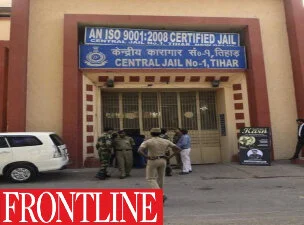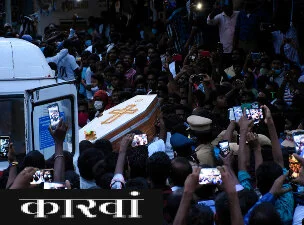Torture in police custody has often been termed a ‘public secret’ in India. Its routine and pervasive nature is rationalized as being necessary for maintaining order, preventing crime or ensuring justice. Despite numerous constitutional and legal protections to ensure the rights of individuals in custody, police brutality has never been more frequent in India.
Read MoreAccording to recent news reports, a committee constituted to suggest measures to curb sexual violence against children recommended to the Union government that offenders above the age of 16 years under the Protection of Children from Sexual Offences (POCSO) Act should be tried as adults. It has also been reported that these recommendations will soon be tabled in Parliament.
Read MorePerarivalan has been in prison for almost 30 years for his role in the assassination of Rajiv Gandhi during the 1991 election campaign. At the heart of the injustice being inflicted on Perarivalan is that government agencies have continued to insist on his incarceration despite being unsure of his role.
Read MoreMapping the responses of feminist groups to the J. S. Verma Committee, this article underscores inconsistencies between the positions on defining sexual offences on the one hand and suggesting appropriate punishments on the other. It argues that the absence of engagement around complex issues of criminal law and sentencing not only left feminists divided on the outcome in Mahmood Farooqui’s case but also revealed unintended consequences of the newly introduced law on rape.
Read MoreWhen the Supreme Court of India upheld the constitutionality of the death penalty in Bachan Singh v. State of Punjab in 1980, it also laid down a sentencing framework for subsequent sentencing courts, guiding them in deciding between life imprisonment and the death penalty. This framework, popularly known as the ‘rarest of rare’ framework, was focused on individualised punishment. However, subsequent judgments have strayed away from Bachan Singh’s core framework, and the use of penological justifications as sentencing factors has contributed significantly to this deviation.
Read MoreTackling crimes against women and children requires broader social reforms, sustained governance efforts and strengthening investigative and reporting mechanisms, instead of merely enhancing punishment.
Read MoreIn a bid to curb torture, a three-judge bench of the Supreme Court recently mandated that CCTV cameras be installed in police stations and offices of other investigative agencies. Though a significant step to curtail custodial torture at these sites, it can have a meaningful impact only if coupled with long-pending reforms to end impunity for torture and a change in the culture of police violence.
Read MoreWhile medical and forensic evidence can help show how a crime may have occurred and identify the perpetrator, it is important to understand that they are riddled with limitations.
Read MoreRecent allegations of sexual harassment against filmmaker Anurag Kashyap by actor Payal Ghosh have opened fresh debates on the ‘Me Too’ movement in India. This article highlights issues stemming from abandoning due process mechanisms for nebulous allegations on social media, and underscores how this could potentially intensify the problems confronting survivors, furthering their marginalisation.
Read MoreThe Committee for Reforms in Criminal Laws has adopted measures that raise serious concern about its rigour, and its haste to rush through its mandate will have long-lasting consequences for the criminal justice system.
Read MoreIn the forty years since Bachan Singh upheld the constitutional validity of the death penalty in May 1980, there have been numerous concerns about the fate of the death penalty sentencing framework laid down by the majority. Inconsistent application, interpretational errors, and judge-centric decision making have dominated these concerns. However, this article seeks to revisit the premise of those narratives, i.e. these concerns have emerged as a result of the incorrect application of Bachan Singh. The focus is instead turned to the gaps within Bachan Singh itself and the manner in which those gaps have contributed to the subsequent fate of the sentencing framework. Demonstrating a complete collapse of what has come to be known as the ‘rarest of rare’ doctrine, the article identifies the procedural and substantive faultlines that have only widened over the last four decades. A profound lack of commitment to the rule of law and fair trial rights during sentencing proceedings lies at the heart of this doctrinal crisis where the courts are now burdened with a standard that is barely judicially maintainable. Unless we develop significant normative coherence and bring the full force of fair trial rights to bear on sentencing procedures, the constitutional crisis within death penalty sentencing will only deepen.
Read MoreOver the last two decades, scientific inquiry into the underlying basis of different forensic disciplines has surged. This movement has particularly focused on pattern matching disciplines which historically developed on the basis of observation and reasoning without any scientific testing, in order to aid police investigations.
Read Moreभारत में पुलिस थानों और जेलों में नागरिकों के साथ मार-पीट असामान्य बात नहीं है लेकिन तमिलनाडु के तूतीकोरिन जिले के 62 साल के पी. जयराज और उनके 32 साल के बेटे जे. बेनिक्स की पुलिस हिरासत में हुई हत्या के बाद ऐसी घटनाओं को रोकने के तरीकों पर काफी चर्चा होने लगी है.
Read MoreOn 14 July 2020, a three judge bench of the Supreme Court delivered its judgment in Arjun Panditrao Khotkar, in what ought to have been an authoritative ruling on the law on electronic evidence.
Read MoreAs a country, Indians seek accountability selectively because their commitment to the rule of law is not principled.
Read MoreIn violation of the law, the constitutional right to fair trial at sentencing and a landmark 40-year-old Supreme-Court decision, Indian trial courts impose death sentences only by brutality of crime, without considering individual offender circumstance, probability of reform or life imprisonment.
Read MoreThis paper asesses the impact of the Criminal Law Amendment Act, 2013 (CLA-2013) on rape adjudication, by examining 1635 rape judgments from trial courts of Delhi pronounced between 2013 and 2018. Of these, 726 cases were adjudicated under the old law, of which 16.11% resulted in convictions and 909 cases were adjudicated under the CLA-2013, of which 5.72% resulted in convictions.
Read MoreProject 39A at National Law University, Delhi analysed judgments of all capital cases (215 in total) across trial courts of three Indian states, Delhi, Madhya Pradesh and Maharashtra, decided over a 16 year period from 2000 to 2015. The resulting report offers an insight into the nature and extent of the broken state of capital sentencing as practised at the lowest level of the judiciary in India.
Read More

















